#it could still be genuinely what utena wanted to be
Text
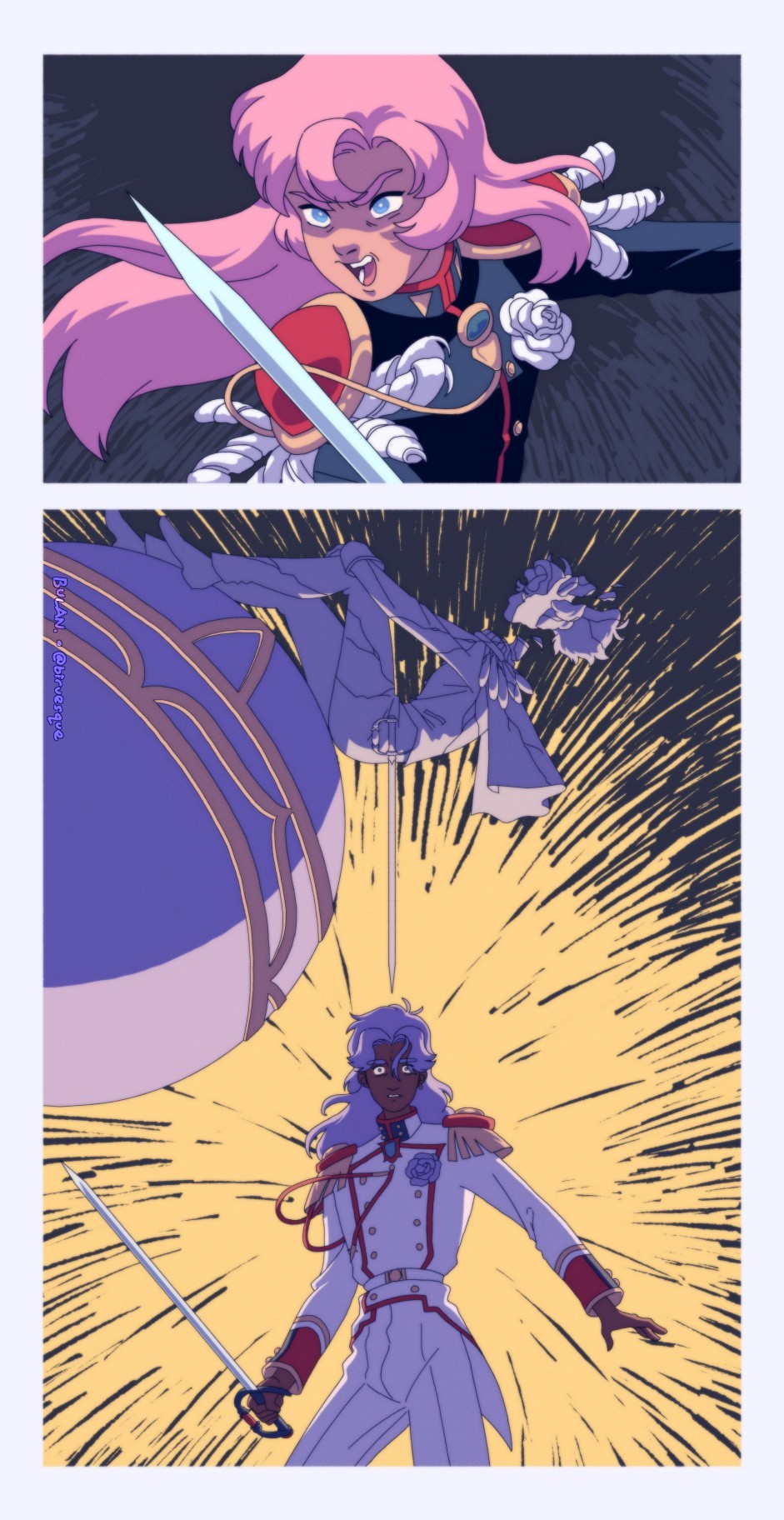
"I'm going to become a prince!"
#revolutionary girl utena#rgu#shoujo kakumei utena#sku#tenjou utena#utena tenjou#utena#ohtori akio#akio ohtori#akio#biruesque art#this is one of my fav moments from 38 idk it's so powerful#but yk the concept of “prince” in 38 and 39 is still vaguely up to interpretation i think#it could be the figure doomed to die from saving someone#like in juri's story#it could be an impossible and unattainable virtue#it could still be genuinely what utena wanted to be#and that she still believed in some version of it even if it was removed from akio and dios#eitehr way the way dios' grave just shatters#its so fucking good i oaaouaououghghg
2K notes
·
View notes
Text
imo both answers make sense in different ways, i could see her crush on akio as genuine feelings being used against her or as comphet + being overwhelmed/anxious around him and interpreting that as feelings (also she is being groomed to like him it's very calculated on his end). the only wrong answer here is straight utena
#rgu#revolutionary girl utena#utena tenjou#im in camp lesbian utena because it really does feel like shes being swept up in wanting to be normal#and has strange ideas about romance and is being heavily groomed into having a crush#both with akio and touga really#but then again i can still see bi utena cause it could be genuine attraction that the men are using to hurt her#that happens often irl#ik this question has been debated a lot im just curious what the general tumblr utena fan consensus is#gootpost
26 notes
·
View notes
Text
like it’s actually crucial to utena’s development that she is first presented as someone who is totally independent and refuses to conform to any kind of socially imposed rules. she’s a girl prince, her uniform is completely different, and everyone loves her for her radical swag. but almost immediately utena claims that she is a “totally normal girl looking for a totally normally boy” and that she is engaged to her Prince. and even the intro questions that, is utena deciding to be a Prince such a good idea?
and at first, you assume that the intro is being sexist, and that they’re just undermining utena for wanting to inhabit a Boy Role, which is why she does experience pushback from authority figures who cannot stand that she’s disrupting unspoken social codes. utena is simultaneously resisting gender norms and inhabiting the role of prince to save other girls, and insisting that she’s normal and cis and hetero. so almost immediately it’s like. well okay, what’s going on here.
utena doesn’t seem to want to reject social norms, she just wants to inhabit a role that is generally denied to her. so the constant tension between people undermining utena’s princeliness and trying to get her to inhabit more feminine modes of presentation, and utena herself obstinately insisting that she doesn’t want to be “queer” (and understandably so!!! being 14 and closeted is scary!!! especially when the literal personification of patriarchy is making you constantly question everything you ever believed!) and that she’s “normal, actually” is… confusing.
which is why it’s so important that anthy straight up says “you can’t be my prince, because you’re a girl” because it’s the exact mantra utena has heard her entire life and pushed back against, and in anthy’s case, she’s also stabbing her with a sword (of hatred) as if to emphasize that being a girl means being doomed to suffer. so utena pushes against that, whether because she wants to be a prince, or anthy’s prince, or because she’s not a girl, or a combination thereof. and she manages to do what akio could not because she smashes the rose crest and with it, all its harmful trappings, and reaches anthy in a genuine gesture of love.
and even then, anthy still falls, because the idea that a prince could save someone else from their suffering has always been an illusion. and that’s when utena realizes that she cannot be anthy’s prince, not because she didn’t sufficiently transcend gender norms, or because her heart wasn’t sufficiently noble and true, or because she didn’t fight hard enough, or because she didn’t love anthy enough. no matter what she had done differently, it would have always been futile, because the designation of princehood has always been hollow. no matter how pure her intentions were, she was nevertheless participating in a system that relied on the exploitation and suffering of others to function.
she attached herself to it because it was the only path she had to achieve her goals, but that path was nonetheless chosen for her. even if it seemed radical, she was always emphasizing her normality, trying to impress that despite not conforming to a strict binary, she was still conforming to something. but when she leaves the narrative’s confines, she is also transcending the notion that she can only rebel against certain social codes on other people’s terms. she can define her own terms now, free of impositions. being normal has nothing to do with us.
#utena#u#analysis#manalysis#and in no way am i prescribing WHAT that means for her#because that negates the point#so im not saying she’s transmasc#but I’m not NOT saying she’s transmasc#im saying SHE defines who SHE is (or he. or they. using she/her pronouns for convenience but like. you get it)#sigh .
156 notes
·
View notes
Text
akio and the coffin
it’s fascinating how akio both literally IS the coffin of ohtori academy and, simultaneously, is trapped by it. ohtori academy is in many ways a manifestation of the ugly side of adolescence, of clinging on to something in your past and refusing to move forward in your life. every character has something they continue to hold on to despite the fact that they ought to let it go for the sake of growing and maturing. for example, saionji has his inferiority complex regarding touga, his refusal to let go of the simplicity of their childhood together when he felt that they stood on the same ground, and that touga saw him as an equal. everything he does in the series is an attempt to make himself feel as though he is finally on equal grounds with touga. if he would only stop tying his self-image to the perception that touga is somehow above him, that touga looks down on him, then he would be able to let go of that sense of inferiority and move on. but he can’t. juri refuses to let go of the pain she feels regarding her past with shiori, and continues to see shiori as someone who is “innocent”, albeit cruelly - someone who is unknowing of the pain she causes juri through her actions when in fact, shiori in seducing the boy she thought juri loved was deliberately acting to hurt her. if juri would only realize and accept the true intentions behind shiori’s behavior, then she could get one step closer to understanding shiori, to being understood by her, and moving past the pain of shiori’s betrayal. but she can’t.
most of the characters, except utena and anthy of course, remain in ohtori by the end of the show. while they’ve all made progress in “maturing” thanks to the events they experienced throughout the series - both saionji and touga’s as well as juri and shiori’s relationships have gotten visibly better, as shown in the final medley of scenes - they still have more growing to do, hence why they remain in ohtori academy until their time comes. one day, the show suggests, they might also revolutionize their own worlds - their own selves - and finally leave the coffin of ohtori behind as well.
so where does that leave akio? i think he can be said to literally be the coffin of ohtori in that he is explicitly shown to try to manipulate others into remaining stagnant, to clinging on to whatever toxic things they are struggling to process and come to terms with, though this is of course only shown via the characters he most directly interacts with. naturally it comes across most clearly with anthy, although i think utena and to a less direct extent, touga, are the other two people who are the most straightforwardly influenced by him. when it comes to anthy, she clings to her love for the person her brother used to be, the older brother who, at least as she perceived, was kind and caring and wanted to protect people. to protect that older brother, she willingly took on the hatred of the world, and continues to endure the pain of it to this day for what is implied to be centuries. but akio has shown time and time again, through the repeating dueling cycles, that if he was ever kindhearted and genuinely caring, those parts of him are gone now. i do believe he cares about anthy to an extent even now, but whatever affection he has for her is paltry in comparison to his desire to reclaim his power as prince dios. it’s for that purpose that he set up the entire dueling system, for which he freely allows duelists to treat anthy like a prize and an object. and additionally, because anthy is so integral to the power he has now in ohtori, he uses emotional, psychological, physical, and sexual abuse to keep her tied to him. he’s willing to not just let her wellbeing come last, but puts it at the bottom of the list of priorities, and actively tears it down himself for his own benefit. anthy knows all this - but because she still holds onto that love that she had for who he used to be, she stays with him and does his bidding. and that’s what akio wants. he is the coffin, wishing to keep people in their states of despair, conflict, and pain, therefore ensuring that they are compliant and vulnerable to his manipulation.
at the same time, akio is trapped by the coffin like everyone else. he, like all the other characters, has something that he ought to move on from for his own sake as well as the sake of the people around him: his goal to reclaim his powers as prince dios. akio has failed in this goal every single dueling cycle that happened before the show’s events, and as displayed in the final episode, he definitively fails the one that takes place during the show as well. he can attempt the cycle over and over and over again, redo and tweak and modify the dueling system however many times and in whatever ways he wants - it’s all useless. there is no sword that can break open the rose gate. there is no way to reclaim his powers. they’re gone, that part of his life is over, and if he accepted that fact, it would allow him to move on and heal from what he experienced. but he can’t. at the very end of the series, right before anthy leaves ohtori for good, he’s typing away just as diligently as he ever did and, completely oblivious, tells anthy that he’s rewriting the rules of the rose crest, that he’ll be counting on her again. and i didn’t pick up on this until rewatching the episode, but it really just hits you then how utterly stupid he looks, working so hard and speaking so confidently about the upcoming dueling cycles as if any of them are ever going to matter in the slightest. i love anthy’s response to him too; i love the subtle but at the same time so blatant scorn in her words: “you really don’t know what’s happened, do you?” because once again, throughout all this, akio has learned nothing. he hasn’t realized it’s useless, what he’s trying to do; he hasn’t realized all the effort and pain and anguish he’ll cause in people for yet another dueling cycle will never make any difference. he is unable to come to terms with the reality that he will never have his powers as prince dios back. he refuses to move on.
akio is the coffin of ohtori, wanting to keep others in stagnation and regret. he’s also trapped by the coffin, incapable of maturing past his own stagnation and regret. and it really, really says something that all of the other major characters of the show, who have been in ohtori for far shorter a time than he has, have been able to make visible strides in their growth. anthy, who is the only one comparable to akio in terms of duration at ohtori, revolutionizes her world and leaves. meanwhile akio, as deluded and self-unaware as he is, hasn’t made a single step of progress in all this time. the only thing he does is call in bewildered desperation after anthy as she finally leaves him behind, still totally clueless as to what has happened.
tldr; i once saw an author say one of her characters represents inertia, in fact he is inertia. i think that’s a spot-on explanation of akio, at least in terms of what he symbolizes in the story. i want to beat him in the dick with a cactus
#revolutionary girl utena#rgu meta#shoujo kakumei utena#saito chiho#chiho saito#ikuhara kunihiko#kunihiko ikuhara#akio ohtori#ohtori akio#akio rgu#rgu akio#anthy himemiya#himemiya anthy#anthy rgu#rgu anthy#touga kiryuu#kiryuu touga#touga rgu#rgu touga#kyouichi saionji#saionji kyouichi#saionji rgu#rgu saionji#juri arisugawa#arisugawa juri#shiori takatsuki#takatsuki shiori#juri rgu#rgu juri#utena
191 notes
·
View notes
Text
I finally finished my Utena re-watch yesterday, binging the last three episodes and Adolescence in one evening, and I am Having Thoughts. Mostly about the story from Akio's perspective, surprisingly.
I don't know if I've ever read anyone's exploration of the story from his pov, so I'm going to brain-vomit about it.
From his pov, he's the one who's trapped. The Rose Bride sealed Dios away from the world, whether for his own good or to keep her brother to herself, or both. The princely part of him, Dios, is trapped, leaving only the human part of him, Akio, out in the world, trying to regain what he's lost and cope without what he sees as his 'real' power. 'The power to revolutionise the world' is, for him, the regaining of his heroic princely aspect that made him something close to a god among mortals, a natural leader, the greatest warrior.
So what is he left with? What does a regular human man have with which to find his place in the world? What is his role, if not a prince? Is he a ladies' man? An intellectual? A fighter? A logical realist who denies the 'miracles' the prince could perform to keep people safe?
It's clear from the Black Rose arc, and from the final scenes, that Akio has repeated the duels in some form many times, assuming that he needs the right sword to open the Rose Gate and access his old power. He holds this 'might makes right' belief that physical strength or a warrior's weapon is the key to power. When Utena, just a girl, succeeds as the winner of the duels, at first he tries to persuade her to stand down, because how could a girl's sword possibly be strong enough to open the Gate? I wondered, during this watch, if this cycle was the first time that any girls had taken part in the duels, and whether that was by design or accidental. In the Black Rose arc, it's 100 boys who are drawn in to find the power or the eternal something. In this latest cycle, it's the student council, a power structure that represents intellectual masculinity: Juri, as a lesbian in a uniform closer to her male counterparts than to the other female students, might possibly have been the first girl to join the duels, an unintentional outcome perhaps inspired by Mikage, who was more easily tempted by a boy than by that boy's older sister. She still represented an aspect of masculinity in her own way, as the logical realist who denies miracles. Likewise, Nanami joins the duels initially to stand in for her brother, and leaves when she is confronted by how damaging the system is to the very people it's supposed to protect.
I wondered if perhaps Utena was never meant to join the duels. If Dios had meant to find Touga and Saionji on that particular day, and stumbled on Utena because they did. If Utena joining and winning the duels was never part of Akio's plan, and that's why he, and all the others, are so perplexed by her and never figure out how to get the better of her. Akio tries to force her into the role of 'Girl' because all he knows is playing the role of 'Man', and what else is a man supposed to do with a girl besides protect her or seduce her?
Utena succeeds because, for all her talk about wanting to be a prince to rescue girls, she gives up that roleplay and acts of of genuine love and compassion. She succeeds in besting the Rose Bride's curse because she doesn't approach it like a man, trying to seduce, fight, or logic her way through, but by loving Anthy and by having the compassion to want to end her pain.
Utena is still very much about smashing the patriarchy (literally in the case of Adolescence), but in its own way it also artfully deconstructs the ways in which patriarchy hurts men too, by limiting the roles available to them. Utena offers an alternative to the masculine roles of warrior, lover, intellectual and cynic, as well as to the feminine role of princess. The student council recognise it in the end, but Akio never does, because he is so utterly stuck in his role. That's why Anthy gets to leave at the end, telling him he's the one that's trapped, because Utena showed her that she, and we, can choose our own roles.
270 notes
·
View notes
Text
Bucchigiri Utena Parallel-Wannabe Heroes and the Illusion of Fairy Tales
Apart from the NNL segments, I've also had some thoughts on the Bucchigiri storyline and it's parallels to the themes of Revolutionary Girl Utena. And this time my focus as been on Matakara, who has often been hailed as being the true protagonist and hero of the story because of his honorable, kind-hearted and proactive qualities. Much like Utena herself.


And like Utena, the two share a somber backstory where they held on to fairy tale beliefs to help them overcome their hardships and grow into the heroic figures they wish to be. But what they don't know is that they naively followed these tales without realizing the misinterpretations of those beliefs that have been passed down for generations and would soon become victims of the fairy tale figures that once inspired them.
But before I can delve into that story, we need to talk about this story.
Note: This post will contain MAJOR SPOILERS from the Revolutionary Girl Utena anime. If you still haven't watched it and want to be unspoiled, then please refrain from reading this until you've seen it. If that doesn't bother you, then go on ahead. Also, I would strongly recommend speaking with a friend or a reliable user about the dark and trigger-worthy content featured in Utena before watching. It's a great show but it does get DARK.
Also, there's another user who's planning on making an analysis post comparing Matakara and Anthy Himemiya so keep an eye out for that if you're interested in more Bucchigiri-Utena parallels.
Part 1: Origins of an Orphan
To start, Matakara's backstory and his idolization of Arajin has multiple similarities to Utena's backstory. For the purpose of this section, I'll be using the version that was shown to us in Episode 1 and not the true version.
"Once upon a time, many years ago, there was a little princess and she was very sad. For her mother and father have died."
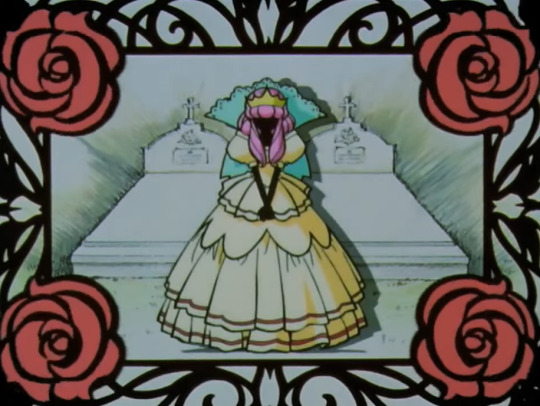
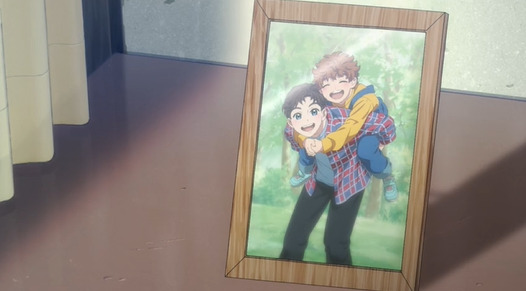
The first piece of info that Utena gives us is that she was an orphan and was in despair because of her parents' deaths. Though Matakara's own parents haven't been brought up nor has it been explained what became of them, it's clear that he lost them at an early age. And while he did have his older brother and his presumed relatives to watch over him, this did very little in helping Matakara overcome his grief or escape the shadows that haunted him since he was little.
"Before the princess appeared a traveling prince riding upon a white horse. He had a regal bearing and a kind smile. The prince wrapped the princess in a rose-scented embrace and gently wiped the tears from her eyes."

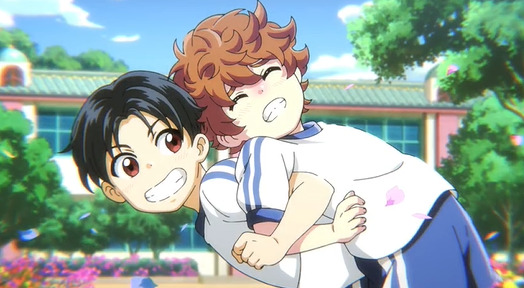
While lacking the regal bearing and white horse, Arajin was the traveling prince who came into Matakara's life and inspired hope and light within him. As shown in their flashbacks, he was always a friendly and cheerful boy who radiated confidence and spirit. A true hero that Matakara could look up to and help him overcome his sorrow.
"Little one, he said, growing up alone in such deep sorrow, never lose that strength and nobility. Even when you are a young lady. I give you this to remember this day, we will meet again. This ring will lead you to me one day."
The crux of Matakara and Arajin's friendship was their desire to train and grow into becoming true Honki people. Warriors with strong hearts and did not flee from battle. Arajin genuinely saw that Matakara had that potential and encouraged him to train alongside him.
And what's more noteworthy is that the two are given a token to immortalize the moment. Utena is given a rose ring to remember the prince and her own nobility while Matakara is given a friendship stone to remember their bond as future Honki People. Even as their fated princes leave, the two heroes carry those precious tokens well into their adolescence years, never forgetting their mission of becoming the people they want to be.


It could also be argued that Mitsukuni, his older brother, could qualify as the prince in this scenario as he inspired him to stay strong in the face of adversity. Such as in Episode 8 where he explained the creed of the Honki and how he inspired his little brother to be brave like them. He even brings up their creed to Matakara just before he's hauled away to the big house.

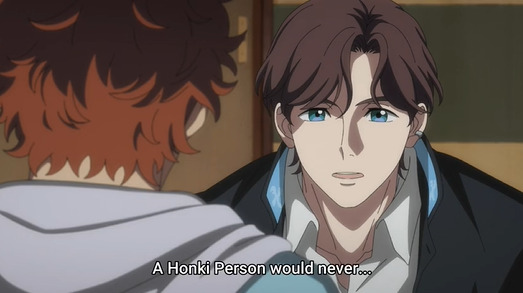
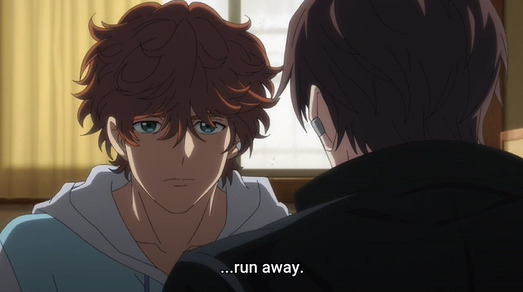
"Perhaps the ring the prince gave her was an engagement ring. This was all well and good but so impressed was she by him that that the princess vowed to become a prince herself one day."
So the cherished prince rides off into the world leaving Utena alone, much like Arajin and even Mitsukuni would leave Matakara alone because of their respective issues. But rather then succumbing to despair, the two heroes resolved to maintain the noble spirit that those heroic figures saw in them. Utena went on to become a prince herself while Matakara would become someone worthy of being a Honki person. Though Matakara struggled more on his journey given how he threw himself into bloody battles while being alone, he would eventually be adopted into the Minato Kai Gang and become closer on his path to becoming a Honki person.
And just before we can go straight to Utena's story in the present, the fairy tale closes with a question to the viewer.
"But was that really such a good idea?"
For first time viewers, it's easy to interpret this question about Utena, a girl, becoming a prince since it defies traditional gender roles and what is expected in classic fairy tales. But as the RGU story progresses, we see that the concern comes not from a girl becoming a prince but more on the problems that come with being one.
Two in particular stand out. The first is that men who become princes usually use those roles for the sake of superiority and having control over women. They lack the nobility a true prince should have and relish in the title because of it's power and privileges. The second problem, and the one that this analysis post will focus on, is how princes who live up to those roles are exploited by the people they try to protect.
Part 2: The Truth That is Twisted by Time
All fairy tales, legends, myths and stories which have been passed from one generation to the next. And as the years go by, those stories are often subject to adaptations based on the preferences of the storyteller or how society uses those tales to explain their respective beliefs. A common criticism is how most fairy tales have more imaginative elements in play and avoid the grittier elements that the tale originally used (Ex. Cinderella got her dresses from a tree instead of a fairy godmother and her stepsisters chopped off parts of their feet to get the slipper to fit, Aladdin used African slaves as part of his prince con).
And we see those changes in adaptations in the fairy tales Utena showcased that omit or warp the truth to the ones who hear of them.
Such as in Utena's origins, we're told that it was only a prince who inspired her to become one so she can reunite with him one day. But the truth was that her decision was because she met Anthy who was suffering from the hatred of humanity. And the only way to rescue her was to turn into a prince whom she could believe in.
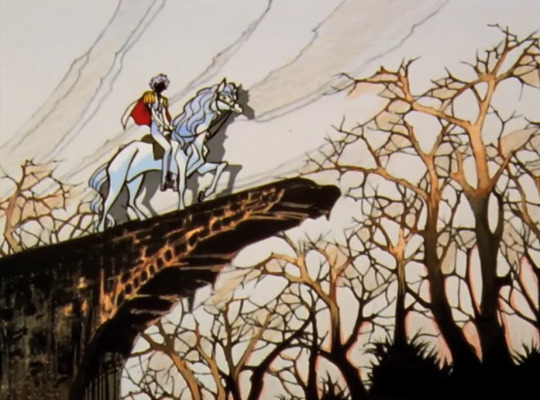



We also see a new adaptation in the backstory of Anthy and Akio which is now known to the world as The Tale of the Rose. The world remembers their story involving a powerful and perfect prince who was stolen from them by his sister who turned into a wicked witch out of jealousy. But the truth was that Anthy sealed him away not out of spite but out of love and concern as her brother was being exploited and over exhausted by a massive, unsatisfied world who overly-depended on him.

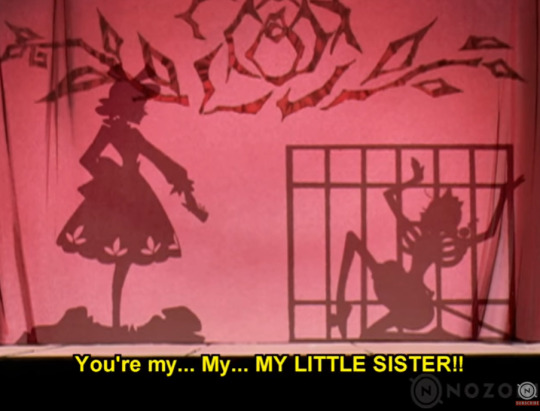


So as Utena demonstrates, the fairy tales we start out learning about aren't exactly as true as their origins demonstrate. They often omit or do away with the more tragic and gray aspects of the characters in those stories. This is all well and good, but what does that say about the Honki People?

Right in Episode 1, we're told that they're courageous and valiant fighters who train nonstop and pour their heart and soul into battle. Despite being brushed off as a simple old story in the present day, their legends and battles prove worthy enough of recognition. They have a temple in their honor, Arajin and Mataraka trained to become like them, and even the city is named after them. The narrative does a decent job in explaining the concept of the Honki People, but what about the people that inspired those legends?
As we see in Episode 9, we learn that Senya and Ichiya actually started out as ordinary humans who dedicated their lives to training and fighting one another, hoping to become a true Honki Person. It's stated that Ichiya was training himself to be a Honki Person so the legend was already around when the two of them were only boys growing up in a Middle Eastern town. And fitting the Aladdin parallels, Senya started out as a simple street rat with no family or home to call his own. And after meeting someone as cool, powerful and inspiring as Ichiya, he decided to spend his life alongside someone he could call his friend.
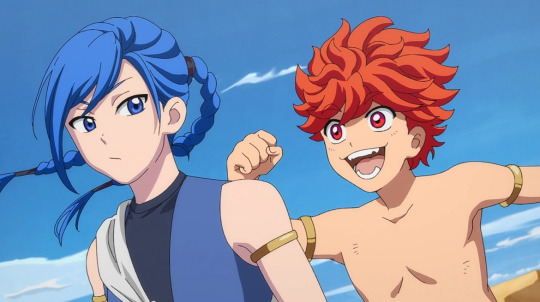
A rather somber element is that while the whole world grew up learning and embracing the Legend of the Honki, none of them actually knew who those Honki People were or what their past lives were like. Would it even matter to them how they started as humble street urchins with no family or home to call their own? They knew what they turned into, but they never stop to think about who these legends started out as or what their backstories or even their names are.
But what's more tragic is what became of Ichiya, the one who inspired Senya. Though we still don't know the exact details for what Senya did that tarnished their friendship, it ultimately impacted his best friend for the worst, corrupting his heart and letting him be filled with hatred and contempt. He no longer valued friendship like he did when he was human and views it as a weakness that must be purged. Perhaps becoming a true Honki Person wasn't all it's cracked up to be given how they're bound to pistols and made to serve whoever finds him for thousands of years.
It's akin to the Rose Prince who's powers were sealed away by Anthy in a desperate act of love leaving him unable to save the world like he used to. Only because of his powerless state did the Prince lose his heart and became a cruel, manipulative and spiteful monster who longed to reclaim what once belonged to him. He would even resort to inflicting every form of abuse imaginable onto his sister as "punishment" for what she did to him. (And yes I do mean every form so please keep that in mind if you haven't seen Utena yet!)
The hero who was glorified and admired in their respective tales loses their nobility in real life, allowing themselves to be corrupted and be filled with new desires of revenge and power. Transforming into the opposite of what they represented in the generations that told their stories. Simply put, they become a villain.
A villain who is...
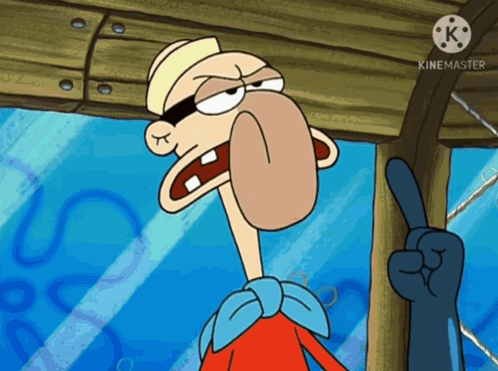
Part 3: The Virtuous Victim Turned Vile Villain
Bucchigiri and Revolutionary Girl Utena are shows that share the themes of fairy tales while deconstructing and subverting tropes associated with them. One of which that the two share is playing on the idea of a heroic or fairy tale archetype (the genie and the prince) becoming the villain of their respective shows. It's even more ironic that the true heroes of those series would start out being inspired by adaptations of them that portrayed them in a positive light only for to fall prey to their schemes when they meet them in real life. Bucchigiri has Ichiya, a true Honki Person that Matakara heavily looked up to, and Utena has Akio, the Fallen Prince Dios who led the sad princess on the path to becoming a noble prince.

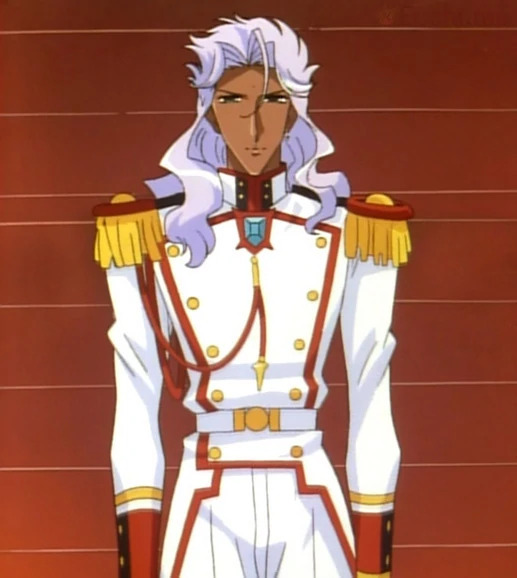
Each of them started out as the ideal fairy tale figure that helped the heroes when they were only children who confronted sadness and loneliness at a young age. But now that they're older and are meeting with them, they end up falling victims to the fairy tales they initially admired and tried to become. And neither of them realize that they're being used as it happens.
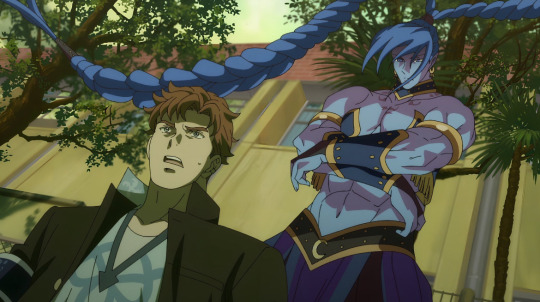
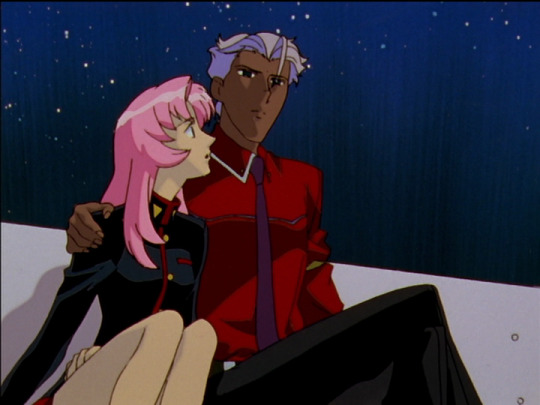
Ichiya's goal is ultimately to merge with Matakara to take over his body and exact his revenge on Senya. As to what Ichiya's motives are after taking his revenge aren't clear, but what is clear is that Matakara will lose himself after being completely possessed. And because Matakara is suffering through his feelings of loneliness and his childhood friend's true nature, he doesn't even notice how Ichiya is manipulating him to improve the merge rate.
Akio's goal has been to groom Utena into producing a noble heart that can help him reclaim his original powers, even leading her in an intimate relationship to further manipulate her. Should he succeed, then he'll discard Utena and move with his life as Prince Dios once again. If not, then he'll discard her and find another person to groom. And Utena doesn't realize this as she's led to believe that he's the prince who once saved her from despair and she'll get the happily ever after she believed will make her content.
The scary part about this, is that they're not the first victims to fall prey to their wicked schemes.
Though it hasn't been confirmed on Ichiya's side, it's heavily implied that he's bonded with other people who found his magic pistol before taking full possession of them. Given how he's lived for thousands of years and initially resided in a public Honki temple, there's no way he would have not been found by some unlucky sap. His common knowledge of possession would suggest he's done this before and has seen the unfortunate results of the person he takes control of, which he mentions to Akutaro.
As for Akio, he also has lived for thousands of years and organized constant Rose Duels in the vain hope of choosing one lucky winner to steal their heart so he can break. Using his sister as a prize to be one, there have been countless tournaments held with the hopes of finding the right target that can help him regain his powers from the Rose Gate.
Alas, neither villain was successful with their attempts given that they've turned their sights on the new generation of heroes to continue their cursed wishes that have lasted for centuries.
And speaking of wishes, remember how I brought up in Part 2 how fairy tales were much darker compared to the more enchanting stories we grew up with?
Well thanks to a peculiar finding by @mahoromouse, I came to realize something about Ichiya and possibly Honki people in general. They're not even genies, they're djinn.
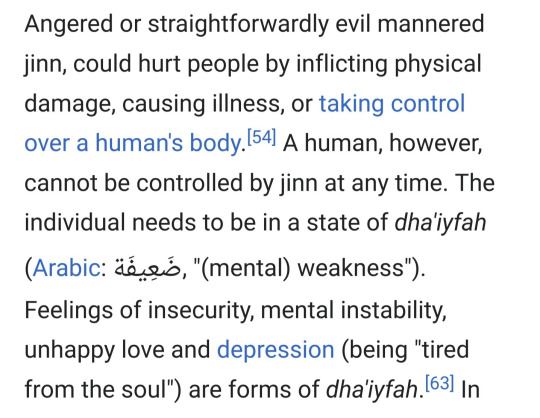
Contrary to the Western media's adaptation of genies as whimsical, playful, wish granting spirits who are voiced by beloved comedians, djinn were actually neutral spirits who were born from fire and were able to wander the Earth like humans do. That said, there are some djinn who grow stronger when interacting with negative emotions found in a human being. It's even said that they can inspire greater levels of negative emotions in a human that they target. Much like how Ichiya is cultivating Mataraka's anger towards Arajin and his fears of the shadows that haunt him.
And how fitting it is that from the moment Senya was introduced to us, Arajin and the audience interpreted him as a genie. Especially given that Senya even offers him a wish while proclaiming that "Honki" can also be spelled to make "Majin" 魔ま人 which in Japanese means "demon person" or "magical person". But have we actually seen Senya grant Arajin's wish of losing his virginity? While he does help the boy in getting stronger and boosting his image as a man, that doesn't mean it's gotten him very close to losing his virginity (thank goodness). And it can be inferred that Ichiya never granted Akutaro's wish despite having stayed by his side during his reign as the NG Emperor.
Given how the Western's portrayal of genies have been popularized and glamorized for years, we have easily forgotten the true origins of genies or djinn and the grittier aspects associated with their backstories.
Conclusions
The theme that the two shows share is how a child who was in a dark moment in their life was inspired by a fairy tale to help them find the light. And so touched were they by the heroes in the stories that they decided to become just like them. But as their respective shows demonstrated, that wasn't a very good idea. The Prince and the Honki Person they once admired turned out to be monsters who resolved to exploit them and reclaim something that was lost to them many years ago. And because they grew up with the romanticized and ideal versions of their idols, they never realized the truth about them which was lost in time mixed with ongoing adaptations that omitted their pasts making them more acceptable to the world.
As for whether Matakara will be saved from Ichiya's corruption while still gaining a heart that does not flee, I cannot say. But as it stands, it looks like Arajin will need to be the one to come in and save the boy he once inspired and who still holds dearly in his heart. And just like I mentioned in my last NNL segment, maybe their friendship won't be the same anymore despite defeating Ichiya. Maybe Matakara will still harbor negative feelings to his friend for how he was mistreated and abandoned for so many years. But much like how Utena ended on a hopeful ending, I believe the same thing can happen in Bucchigiri.
And those are my thoughts on the matter. It's been a great while since I wrote an analysis post this big so thank you if you committed to reading all of this. So what do you think of these themes? If you agree or disagree with anything I've written, please feel free to reblog and/or comment with your own ideas. Thank you and may you have a great day/night!
#bucchigiri#bucchigiri?!#revolutionary girl utena#rgu spoilers#matakara asamine#utena tenjou#arajin tomoshibi#mitsukuni asamine#ichiya#senya#akio ohtori#anthy himemiya#fairy tales#analysis#eddy's post#loving these parallels#anime#long post
66 notes
·
View notes
Text
Mikage: Boy of the Black Rose
I've long struggled to write about Mikage, who I find to be an intriguing yet elusive character. or rather, his character is understandable--his motives and feelings are communicated clearly enough--but his narrative is one of the most inexplicable in RGU. thinking it over tonight, I put my finger on one aspect of the Black Rose arc which I previously didn't know how to approach: specifically, Mikage's relationship with the Boys of the Black Rose.
the boys act as a kind of collective character, a mass of faceless people who whisper in dark corners. since RGU is about social reality, it often uses extras to deliver exposition or set the mood. the Shadow Girls are meta characters, existing somewhat outside the narrative, but regular schoolgirls at Ohtori can serve a similar purpose. they might demonstrate that Touga and Saionji are considered the hottest boys in school, or gossip about Ruka and Shiori's recent breakup.
the Boys of the Black Rose are slightly different, maybe a little closer to the Shadow Girls. rather than acting as bit characters in the larger world of Ohtori campus, I believe their existence is contigent on Mikage. while this could be put in various ways, in the most straightforward terms, the writers created them to help reflect on Mikage's character.
only one Black Rose Boy is given a face: the first one Mikage (Nemuro) talks to. when Mikage asks not to be called "professor," since they are the same age, the boy replies:
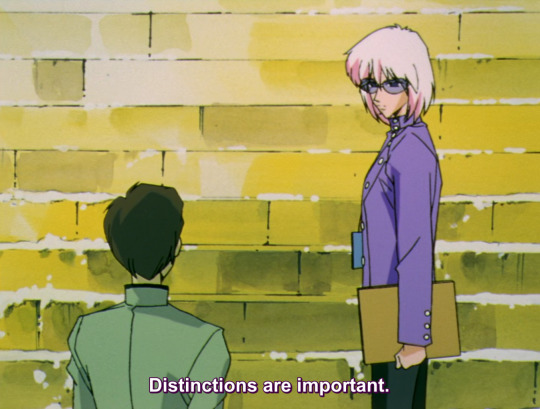
obviously, RGU relies on making its main characters visually distinct from "normal people." Wakaba calls them "special" and resents them. Utena is popular for her specialness, well-liked; in contrast, Mikage is an outcast for his. for a person to be special or a genius, there must be others for them to stand in opposition to. Mikage is set apart from his peers by his pink hair, by his unique uniform, and by being a professor.
after Mikage is introduced to his new work, the boys begin to gossip about him, saying he knows nothing about what's really going on at Ohtori. towards the end of this conversation, there's a shot of Mikage, and then he actually replies from the future to the gossip they were spreading about him.
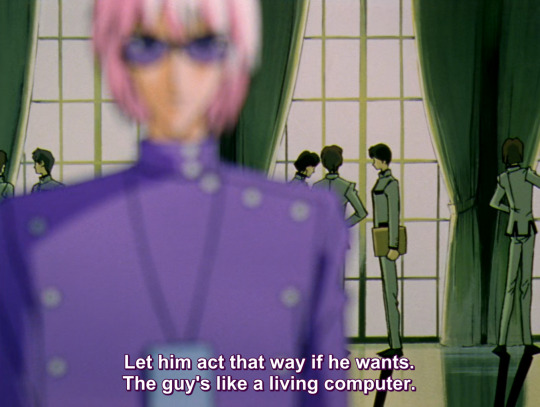
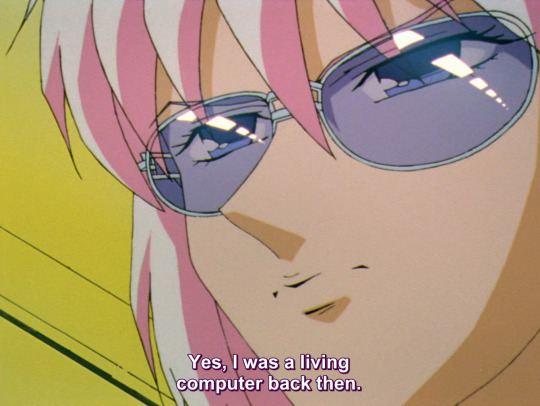
this is Mikage's eternal reality: his recollection of the past. even during the "present" of Utena's narrative, he is still walking through Nemuro Memorial Hall, which is why it's still standing, unburned. the Boys of the Black Rose that the audience sees are filtered through Mikage's memory; whether or not the boys really said these things about him is ambigous. it's possible, but the important fact is that Mikage believes they did.
this transpersonal mirroring keeps Mikage trapped, unchanging. he feels himself defined as unable to connect with others, so he keeps away from them. this becomes a self-perpetuating cycle, leaving Mikage a total outcast.
even outcasts, however, are members of society. the Boys of the Black Rose actually have more in common with Mikage than the average Ohtori student. they're all scientists working on the same project. they have much of his coldness, sense of superiority, and intellectualism. the main difference is that they're the in-group.
while Mikage believes himself to be emotionless, it's made clear that his social isolation hurts him. he doesn't want to be set apart, but he doesn't know how to break through the barrier between him and others. it's very easy to do a queer reading of the character, given the way this is conveyed to the audience.
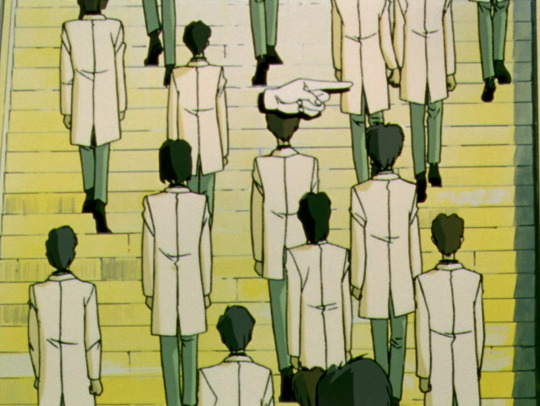
Mikage's fixation on Tokiko and Mamiya is easier to undestand with all this in mind. the world he was living in, occupied by the Boys of the Black Rose, was a cold and alienated one. in contrast, Tokiko has genuine passion, caring for her brother deeply. Tokiko's tears move Mikage, allowing his own buried emotions to break through the surface. but she also reinforces his social isolation; he is equally as hurt by her as he is drawn to her.
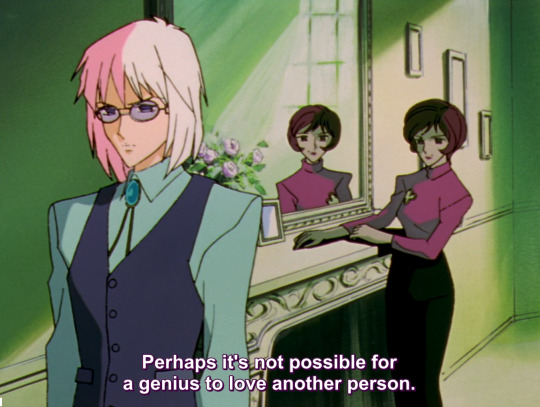
this is part of why Mikage is so determined to "defeat" Tokiko; she offered him hope of connection, but he was never able to "win" her, as men so often try to do with women.
Mamiya is something else altogether; a boy, like Mikage and the Black Rose Boys, but altogether different. warm, friendly to Mikage, not intimidated by his intelligence or reputation, and insightful. in a show full of characters obsessed with holding on (to the past, to a person, to their self-image), Mamiya is the only one who can see the wisdom in letting go.
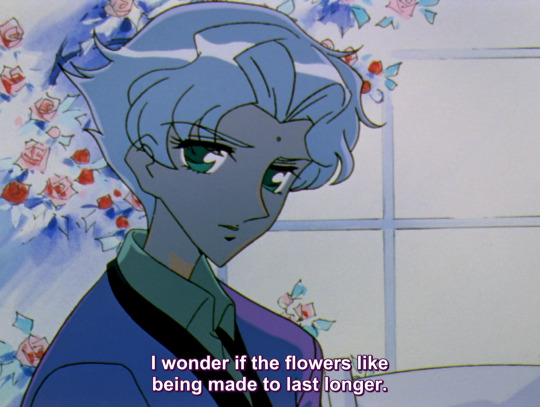
Mikage at first is open to Mamiya's words, preparing to call off their quest for eternal life. but like every character who threatens the system in RGU, he is faced with Akio. in a prototype of the later "End of the World" sequences, Mikage comes across the kissing Tokiko and Akio. this proves to be too much for him; there are some things he can't afford to lose.
the scene has significance to Mikage far beyond disappointment in love. he wanted to create a family with Tokiko and Mamiya; marriage to Tokiko would tie them together "forever." if he could be by Tokiko's side as they lost Mamiya, then at least he wouldn't be alone after his death. but if he's only Tokiko's coworker, when their work is done, he's back to being a computer.
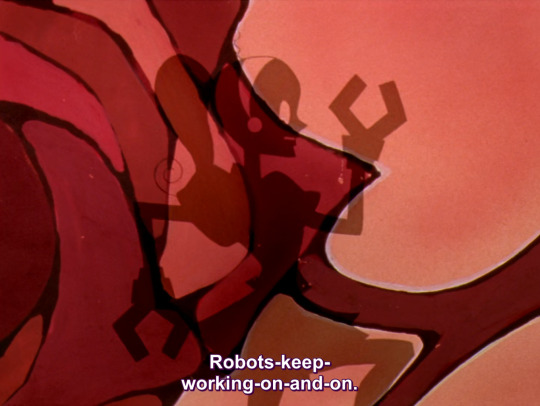
in desperation, Mikage plays into Akio's hands. under contract, he sacrifices the Boys of the Black Rose and burns down the hall that bears his name. when justifying himself to Tokiko, he claims that this act will allow them to attain eternity. in the events of the series, he's still at it: installing Mamiya as the Rose Bride will, after all, make him eternal, even though it's the very kind of eternity Mamiya wanted nothing to do with.
Mikage retreats into delusions on feeling the sting of Tokiko's rejection. though he is the one who betrayed her, he turns it around and feels betrayed himself. going even further, he casts Mamiya as the one who set the fire.
the Boys of the Black Rose are also used to emphasize his inability to face his own actions. throughout the arc, the boys are seen pushing coffins around. however, in episode 23, Mikage takes their place right before he is forced to face the truth about himself.
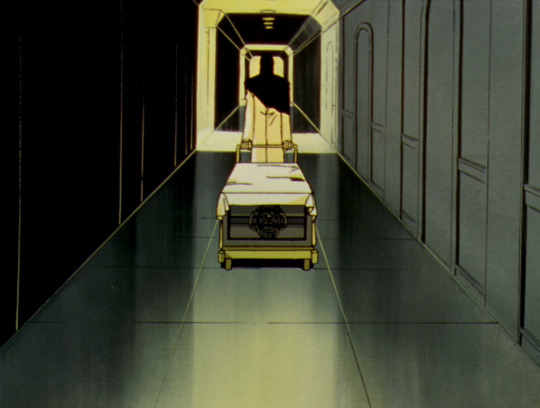
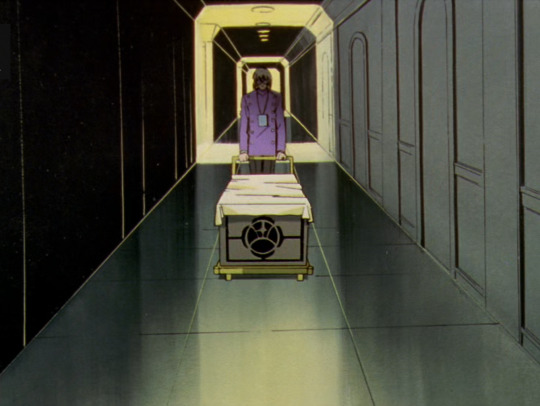
at the end of the arc, Miki claims that no one was hurt in the the fire, contradicting the previous story of Nemuro Memorial Hall. this possibly indicates that the murders are a figment of Mikage's imagination--the older Tokiko doesn't seem to react to him as if he's a murderer. more than anything, he seems guilty of self-denial and retreat from reality. Tokiko went on to accept Mamiya's death and even mourned for Mikage, while he ignored her in favor of his memories. the fact that he does not recognize her feelings is another aspect of his tragedy.
Mikage, through his fruitless revolution, loses the very things he always wanted. he attempts to throw away his past self, the cocoon of Nemuro hatching into the butterfly that is Mikage. with it, he burns away the boys who rejected him, who embodied the cold world he used to live in. he uses their sacrifice to enshrine Mamiya, idealizing him as the perfect companion. but as Ikuhara said, he was doomed to fail from the start:
Those who reject that place are, conversely, rejected by it as well. This is the nature of systems: the moment you reject them, you are forced to realize that they’re the very ground you’re standing on. Mikage noticed the trick behind the system, and he hurriedly attempted revisions. But the adult who’d created the system just said “Let’s not,” and unilaterally brought the curtain down.
the "trick within the system," is, I think, the fact that it's socially constructed. Mikage believed that on realizing this, he could simply remake the world as he wanted. he was allowed to do so for a time, when it was useful. when he ceased to be useful, he was dispatched with, because while he had operated within the system, he was not in control of it. and beneath his delusions, there was still a reality.
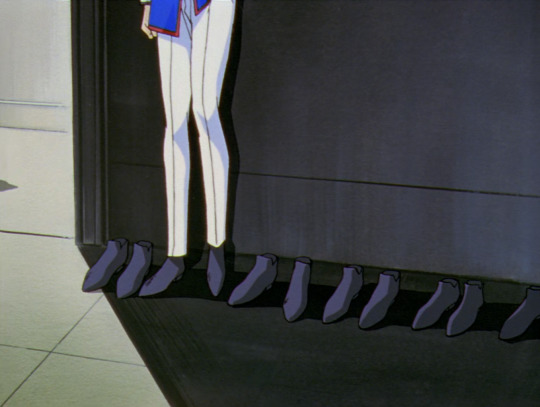
Mikage is the true Boy of the Black Rose: the true ghost, the true sacrifice, living in the desiccated world of a preserved flower. throughout the arc, he takes possession of Ohtori students who suffer from the same afflictions as him, and every time Utena defeats one of his duelists, another part of him is exorcised--another Black Rose Boy burned away. in the end, the only thing left of him is the ruin of Nemuro Memorial Hall, shown briefly in the final episode. he graduates at Ohtori, but only after losing absolutely everything. that seems to be the only way to step into adulthood: naked and shivering, like the day we are born.
122 notes
·
View notes
Note
how would you fix mercymorn though
GREAT question and I have actually not thought about this nearly enough because I'm such a huge fan of what's wrong with her!
The problem with fixing mercy is that she's living with 10k years of pent up grief and guilt that she believes she can never be free of so in order to fix her you really have to get her out of that mindset which you can't do if she's still a lyctor hanging out with john & the gang. So my first step would be to get her to leave, a real utena style just walk out you can quit if it sucks hit the bricks type of deal. Which wouldn't be that difficult since she's just looking for a reason.
Then I think I'd give her an earnest protege who's capable of pushing back when she acts like mercymorn. it would fuck her up enough that she'd start to experience her emotions again and from there she could have her breakdown and start thinking about what she wants to do about john and her own part in the empire. I also believe deep in my heart that mercy needs someone to hold her and tell her it's going to be all right and that if she experienced this in any genuine way she WOULD cry her eyes out
#replies#basically she needs people to have genuine emotions around her#it would break her but you have to before you can really fix her again
57 notes
·
View notes
Text
Lesbian Anime Review #12 - Revolutionary Girl Utena & Adolescence of Utena
Hey
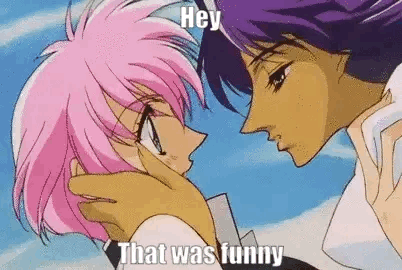
That was funny revolutionary
How does one review a piece of media so foundational to everything else that it inspired?
Going into Utena, I felt like I wanted the show to prove itself to me. Why is this one always put on such a pedestal? When something is so universally acclaimed as this, it sets expectations so high it should be unreasonable for it to meet them.
And yet.
Utena serves as a reminder that sometimes we put pieces of media on a pedestal because they've earned gold.
In this show a girl transforms into a cow and the cow returns for the movie.
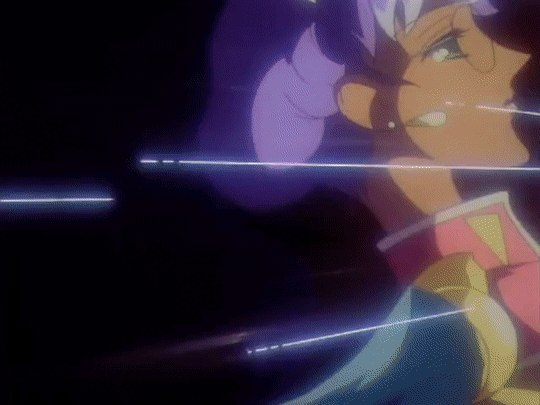
My biggest criticism of this show is it needs a flashing lights warning all over it. Some of the shots are really difficult to look at, which is such a shame considering how gorgeous the animation can be.
I don't know if it's possible for me to have an original thought about Utena. After finishing it and the subsequent movie, I spent some time listening to people's takes, impressions, and theories about it. I gained a lot of insight through that process. It helps that people have had a lot of time to dwell on this show and its meaning. When I finished it, I felt that I was still searching for more of that meaning. Utena doesn't try to explain what its themes and symbolism mean and a lot is left to the audience to interpret, but I got the distinct impression that it was supposed to carry a specific meaning, not something vague or nebulous. For a while this meant that I felt frustrated that after everything I still had lingering questions, as though there should have been answers I could have found, but by now I think I'm content. I found answers to the questions that needed answers, and what was left could remain unanswered and that was okay.
Anyway, Nanami episodes.
Utena is a show that has a serious plot with the duels and the student council and the absolute destiny apocalypse and all that, but every 4 episodes or so you're treated to a precious gift in the form of an episode centred around this little shit head.

She's the best character and she has ridiculous episodes that seem only tenuously canonical but I'll be damned if they weren't fantastic.
I really liked the part where she was pursued relentlessly by a group of elephants while she tried to acquire a rare spice to create a curry that will reverse Utena and Anthy's body swap.
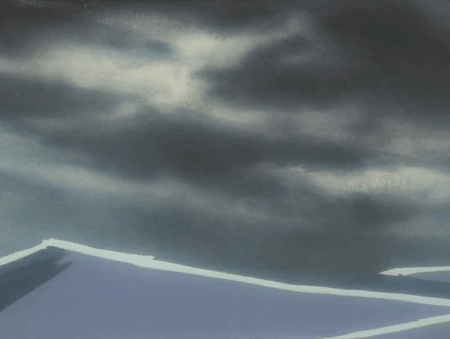
RELENTLESSLY.
So this anime is about a girl called Utena who wants to be a prince because when she was a kid, a prince showed her kindness when her parents died and gave her a ring that would apparently lead her back to him eventually, and she thought that guy was sick AF.
Utena is good at sports and wears a masculine school uniform and all the girlies like her. She learns that the student council at her new school is fucked up and they've all got the same rings as her, which identify them as duelists. They have sword fights to determine who has the right to marry the Rose Bride, a girl called Anthy. Utena thinks this whole system is batshit, but she has to fight duel after duel because she just keeps winning and people keep challenging her. Anthy seems unnervingly chill about a lot of it, but also seems genuinely happier when she gets to be with Utena rather than any of the other freaks who are dueling for her.
Damn everyone in this show wants to beat up Anthy so bad! I mean, Utena doesn't but they're like girlwives so that's to be expected but everyone else loves smacking her around. I can understand why Utena's default response was to go protector mode, even though her attitude of wanting to protect Anthy and fight for her would be the thing that ultimately condemns them to inevitable tragedy.
Spoilers below the gifs!
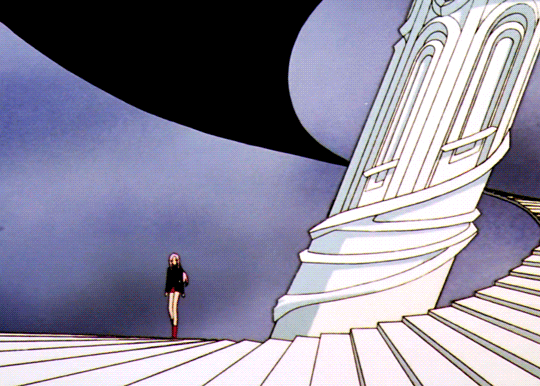


The rest of this review is going to be messy. I'm not sorry.
At least one of the themes of Utena was unclear to me until after I had watched the movie.
I understood that the school represented adolescence in general and that escaping the school meant breaking free of that and becoming empowered with independence.
At the end of the series, Utena has a sword fight with the big bad, frees Anthy from her prison and presumably dies in the process. She had spent the whole series fighting for Anthy and trying to win her freedom, but the flaw in her thinking is that she never tries to help Anthy by empowering her. She destroys the power structures that were holding Anthy in place, but in the process she destroys herself, when what Anthy needed was for Utena to give her the strength she needed to leave on her own. Even after all the duels fought for her, Anthy doesn't have the courage to take that step by herself, and while Utena is fighting her evil brother, she stabs Utena, which might be the thing that ultimately kills her. Just like how Birdie Wing Season 2 stabbed me in the back after I gave season 1 a 10/10. Utena is dealing with a lot of her own shit this whole time too, which doesn't help her see through to the heart of the matter.
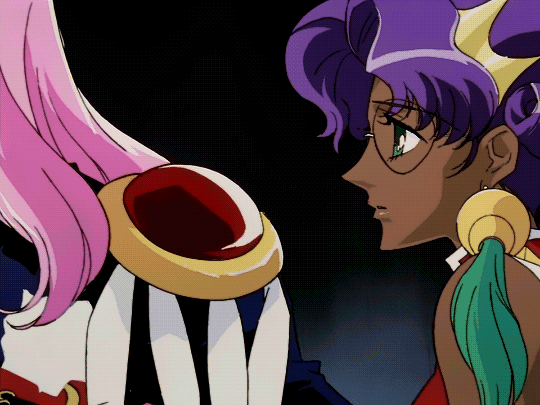
This is contrasted in the movie, Adolescence of Utena, which confused me initially because people had insisted that I watch it after the show and I assumed it might help me to understand more of the show, but it was mostly the opposite.
The movie is maybe an alternate universe, maybe a time loop. It's never elaborated on. The point is it's a retelling but a bunch of the parameters are changed. The relevant part here is that when Utena decides that she wants to help Anthy, instead of fighting her battles for her, she transforms into a car. Cars are used in Utena to represent the power of adulthood and the freedom it confers; the main villain of the series is almost always driving his car and uses it to manipulate and influence people. Utena turning into a car that Anthy can drive to escape the school was the exact thing she needed. From that point, Anthy becomes the protagonist of the film and is able to move forward herself. She is literally in the drivers seat, which is a kind of empowerment that Anthy in the series is never given. This is how I came to understand why Utena failed in the series.
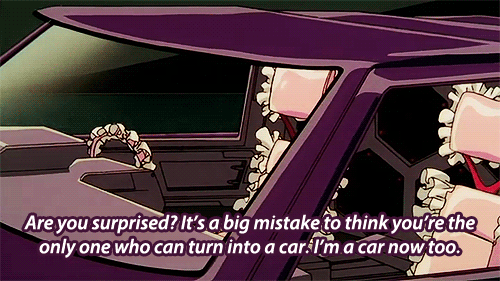
I also liked that in the movie, Utena appears to go into it knowing she likes girls. In the series, there's a conversation towards the end where Juri is talking to Utena about her relationship with Anthy and Utena's response is to push back on the idea that she and Anthy have a romantic connection; she says that it's different from the way Juri feels about Shiori, that it's more "pure". In the movie, when Anthy is insisting that she's become Utena's wife after she wins a duel, Utena's response is that if they're going to have a relationship, they should move forward at a more natural pace. She doesn't deny that they could have a relationship, she just doesn't like that Anthy immediately shifts into wife mode the moment Utena wins a duel. But then they have a romantic dance and it's all good.
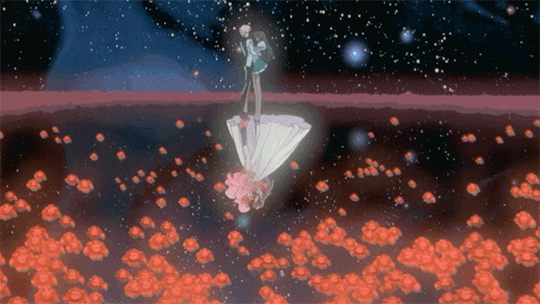
I haven't even talked about "all women are rose brides" and it's difficult to put into words how hard that hit me.
The imagery of Anthy in her rose bride outfit speared with a thousand swords holding her in place and the main villain talking about how actually, all women are just like that: items to be owned and preserved in adolescence without any power to choose or act for themselves. This show did so much.
And the Nanami development was unreal. The joke character who has an episode where she's despairing because she's convinced she laid an egg is the character who discovers that Anthy is being sexually abused by her brother. She's just had her own arc where she learns that her own older brother isn't blood related to her. He then comes onto her like, "this is what you wanted right?", and she rejects him. Nanami is repulsed by what she learns about Anthy and even more that Utena continues to live with Anthy while unaware. The way they grow her as a character is incredible. Thanks Nanami. Hit him with the 10 hit combo into command grab.

I could write another entire review just about Juri and her whole deal. Juri is the fencing club captain and she's crushing on the most toxic girl in the universe who's doing the whole Kaguya-sama bit where she thinks that if she tells Juri she likes her then she's losing at love, so instead she keeps getting into other relationships so that one day Juri might get jealous enough that she confesses first, but Juri just continues brooding and yearning. It's that toxic codependent yuri that everyone keeps talking about and this time I didn't even clock it when I watched the show, I need another lesbian to explain to me why people like Shiori. When I watched it, I just assumed she was a bitch! I was the Juri in the relationship, assuming Shiori was just an evil straight girl.

So yeah, everyone was right about Utena. It's one of the lesbian anime of all time. Ikuhara does it again. This guy really is my favourite director. This does mean I have some bias because I love all the things this guy does with his shows. I just need to watch Sarazanmai and I'll have seen them all.
Of course I'm giving this a 10; if not this then what are 10s even for? There's a lesbian sword fight in almost every episode. I'll be thinking about this show for the rest of my life. And I shouldn't need to remind you, but I cannot be killed. Zettai unmei mokushiroku.
Fuck, would it be too cringe to get that as a tattoo?

92 notes
·
View notes
Note
PLEASE PLEASEEEE CAN U SAY UR ROSE BRIDE NYA AND PRINCE JAY THOUGHTS. I AM SOOO INTRIGUED
taking most of this from a late night ramble i did: if skybound sucked less and was actually intended to be about how societal norms on m/f relationships can negatively impact people, it could be like utena. just barely. skybound also has some stage play vibes, which ties into revolutionary girl utena's whole deal.
even though jay wants to say that he has no power over nya and he just likes her, he still participates in a system that has power over nya and nya is kind of just taken along with it. this can be about fate in ninjago or about society or about gender or what have you. jay also likes the idea of saving nya.
"all girls are like the rose bride in the end" ties into nya being a bride. nadakhan wanted a bride, and he kind of fits akio's role well enough in terms of manipulation and general creepiness. the rose bride is engaged to a duelist and the duelist has power over her. additionally, nya is 'fated' to be with jay, and nya is tied to her role as 'the girl ninja'. her roles as an accessory to a man overshadow her inherent worth as a person sometimes.
skybound as a season only 'resolves' itself when jay shows genuine empathy beyond the parameters of a normal m/f couple. nya finds empowerment when she's standing up to nadakhan and being the prince in this situation- or at the very least, deciding on her own terms that she wants a prince to help her.
#not art#glad my post hit the target audience (the lesbians)#because i do swap between t4t bi4bi jaya headcanons and nonbinary lesbian jay/trans lesbian nya headcanons#jaya. they contain multitudes.
57 notes
·
View notes
Text
Utena Black Rose Arc Elevator Analysis (Case by case)
(Quick context- I’m going to do the rest of the characters, but I wanted to post what I’ve written so far. I’m going to post one character at a time as I do their analysis.)
So, i wanted to take my own jab at analyzing the elevator in Revolutionary Girl Utena. I can’t promise it’ll be the most extraordinary analysis of this scene only because it’s been analyzed a million times (As has everything in Utena, with good reason of course.) I doubt I’m the first person who’s reached this line of thought or chose to analyze these scenes this way, but I still thought it’d be fun.
So, in the black rose arc, every time somebody went down the elevator and told a confession, the picture in the frame would go from butterfly, cocoon, caterpillar, and leaf. I think this is an allegory for how the deeper into the duelist’s motives they get, the less complicated their motives are, as they become exposed as results of more raw emotions such as anger or jealousy. I also believe that the butterfly represents the way the duelist believes the situation is in the outside world, whereas the leaf represents their truest opinion of the situation, which tends to have some sort of shift from what the originally said about it. The subsequent duels are allegories for causing revolution, but rather than being about a historical revolution, I believe it’s in reference to the dilemma that the character revolves around. I thought it would be interesting to look at this case by case.
Kanae:
Butterfly: Kanae explains that she’s engaged to Akio and that she wants to love him, and genuinely likes him as a person. She feels lucky to be as well off as she is. The complication here is that there’s an exception. She doesn’t explain the exception until after the frame is changed from butterfly to cocoon, implying that she tries to hide this.
Cocoon: The only thing mentioned in this stage is that Akio has a younger sister, who Kanae believes doesn’t like her. This could be because there’s something about this information that she feels the need to filter more, whether out of paranoia or some other fear. It is the truth about how she feels, but it’s deeper than that.
Caterpillar: She gives an anecdote about a time she gave Anthy her favorite scarf, and Anthy wiped her glasses with it, despite Kanae being sure she’d told Anthy that wasn’t what the scarf was for. She had grown anxious after Anthy smiled at her, and later her father had gotten sick. She was convinced that Anthy was somehow responsible. Here we can see what seems to be the whole truth, that Kanae is paranoid regarding Anthy. While this in of itself it still very true, it is by no means the rawest layer of these feelings that Kanae has.
Leaf: In the final stage, Kanae finishes by saying she’s tried everything to get Anthy to like her. This reveals the rawest understanding. While Kanae’s reaction to Anthy could be chalked up to mere paranoia, it’s much deeper in the sense that the paranoia was not the origin. The origin seems to be a desire to gets others to like her. This tells us that Kanae is a people pleaser by nature and that her dilemma in life revolves around whether or not people like her. She fights for her desire to be a likable person to others.
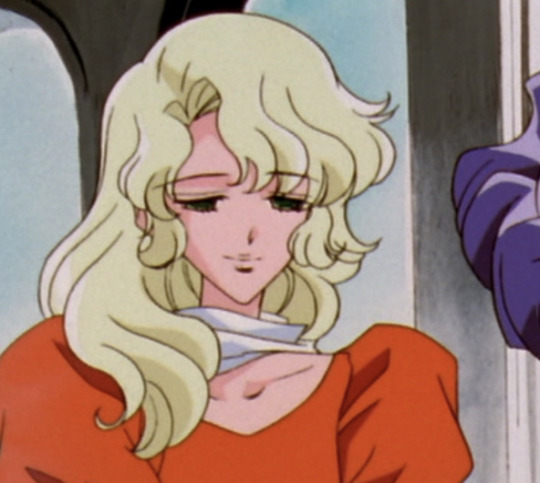
18 notes
·
View notes
Text
i watched the Somerton RGU video and I'm assuming this one isn't plagiarised besides the wikipedia synopsys because I don't think the person who wrote it liked Utena, he keeps joking about how weird the show is and spends half the video trying to pick apart what's real and what is a metaphor and says he dislikes the movie because it blurs the line between reality and the metaphorical events more.
That's not how fiction works! Ohtori academy is definitively real in the show, it's even what Somerton treats as the baseline reality - it's still a metaphor!! For patriarchy or gendered society or just for adolescence in general, the things that are real in the show still mean something. Fictional events aren't either a metaphor or definitively real, this is some dream theory ass analysis and especially with something like Utena that deals so much in symbolism this is such a useless approach and it takes up the bulk of the video. "Do they actually have sword fights or not?" is possibly the least interesting angle you could take here.
Knowing that every time he had a good thought, it wasn't his, really makes me question if he is actually capable of meaningful media analysis that goes beyond 1:1 mapping elements of a movie onto real life (by real life I mean the experience of a white cis gay man). Genuinely does he know what symbolism is?
Then I remembered a clip from the Attack on Titan video where his main argument for why the Eldians aren't a metaphor for jewish people in ww2 is that there are some aspects of the story that don't match real life exactly but. They're marked with stars. There's an obvious ghetto. Everyone has german names in this japanese story. The general look of all the technology clearly say ww2 era. The idea that a story can use this many specific signifiers of a very narrow time and place but because there are some elements that don't match reality exactly, it's actually not about that history is so weird.
So I went to look up the clip and, of course, he is also wrong about the history, most of the things he list that didn't happen in WW2 did actually happen. Honorary Aryans were a thing. There's even direct examples of people of jewish descent (like Helmuth Wilberg) earning honorary aryan status through military service, the thing Somerton confidently claims didn't happen.
There wasn't a crack special forces unit in the Nazi military made up of Jews but the Sonderkommandos are a well documented historical fact. A lot of the day to day operation of the death camps was handled by prisoners who were forced into that position and they were killed and replaced on schedule.
He gets confused about what Paradis is because surely it must stand in for exactly one real historical thing or the whole allegory is fake and claims it's not a ghetto because there is a literal ghetto later in the story. He even admits that it might be Israel but "jewish exile island" is also literally the Madagascar Plan, the only reason this didn't happen was the logistic issues of moving thousands of people halfway across the world while under a naval blockade.
There's so much you can argue about how Attack on Titan uses it's historical elements (and personally I think it uses all of this very carelessly), but denying that they are there because there wasn't a jewish exile island irl is so stupid. I started out just being confused about the RGU analysis and just wanted to get a backup argument but what I actually found is Holocaust disinformation and it feels both wrong to tag this onto the "Somerton doesn't understand what a metaphor is" post but I also don't want to ignore it so here it is. Fuck this guy seriously
13 notes
·
View notes
Text
lets read rgu chapter 12
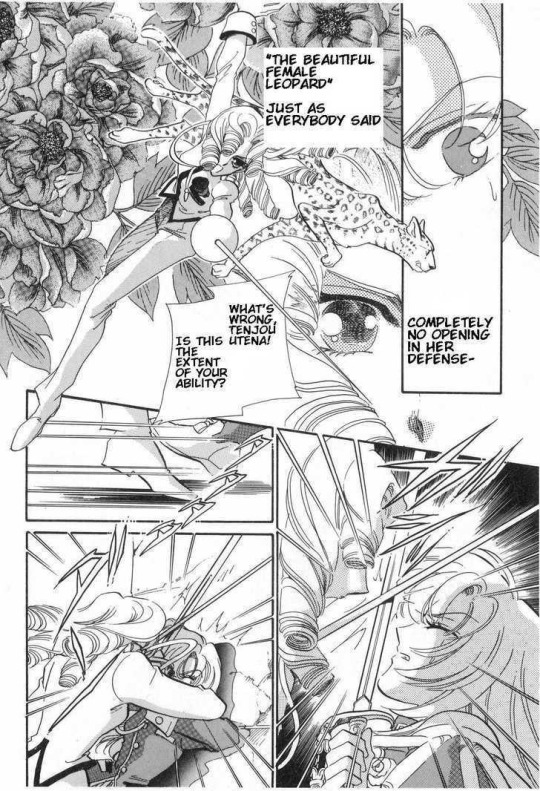
I’ve been told that this version of Juri is the originally intended version of the character? And while I don’t think the person who said that was lying or anything, it’s still kind of hard to believe. Partially because there seems to be a lot of misinformation going around about this series - a lot of folks online seem to think that the manga - the entire manga - came first and the anime was an adaptation from that, which my initial research says is not the case. Partially because that bit of research also gave me the impression that Ikuhara wasn’t very forthcoming with anyone during the production regarding the overall direction of the story. I’m not sure I would buy anyone’s account of what the original vision for Utena’s story was “supposed to be” other than Ikuhara, and possibly not even his.
I could easily see how we could go from anime Juri to this - ie, Ikuhara had an idea for the character that he knew would be controversial so he kept it close to his chest and didn’t tell anyone for as long as possible, leaving Saito with a character design but no character that might as well just be slotted in as a romantic rival for Touga’s affections in a manga story that is at least presenting itself more as an Utena/Touga romance. On the other hand, if manga juri was genuinely the initial intent by everyone, including Ikuhara, from the very beginning, I have a hard time seeing how the pivot from this to anime Juri happened mid production.
I mean, that would take some kind of miracle.

Setting aside other versions of her character - hypothetical or realized - manga Juri is a purely physical threat. She doesn’t have a compelling motivation to relate to, she doesn’t present a significant thematic challenge to Utena’s worldview or princely ambitions. She’s just someone who is good at sword fighting - a fact that the still image format of the manga can /tell/ us, but can’t convincingly /show/. The duel panels are very pretty, but don’t really convey a great sense of danger or difficulty than those with Saionji. And Juri’s supposed unbeatable fencing skill is pretty significantly undermined when just a couple pages into the fight Utena calls down the power of Dios...
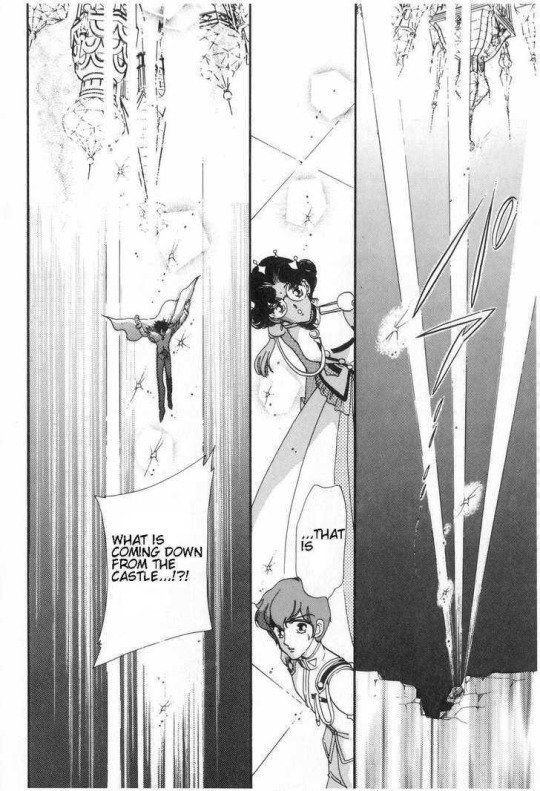
and then Utena just wins. effortlessly.
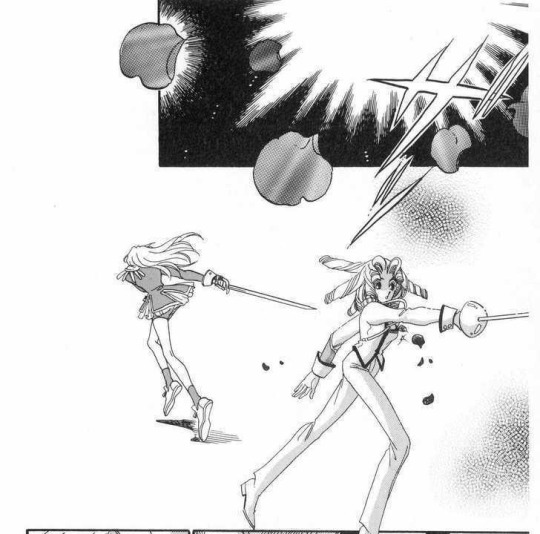
Another unfortunate thing I’m just now realizing is that with Juri having the one sided crush on Touga and being a bitter and jealous antagonist over it, there’s not much left for Nanami to do when she’s introduced....
only she’s probably not going to be introduced, is she? I mean, the dissolving dress party prank thing didn’t happen, we haven’t seen or mentioned her yet, the manga probably doesn’t have time for comedy side episodes... Anime’s best worst girl just doesn’t appear in this comic at all, does she?
Another of my favorite characters missing entirely from this version of the story.
Anyway, Utena tries to ask Touga if he’s the prince who saved her as a child, but can’t quite bring herself to do it.
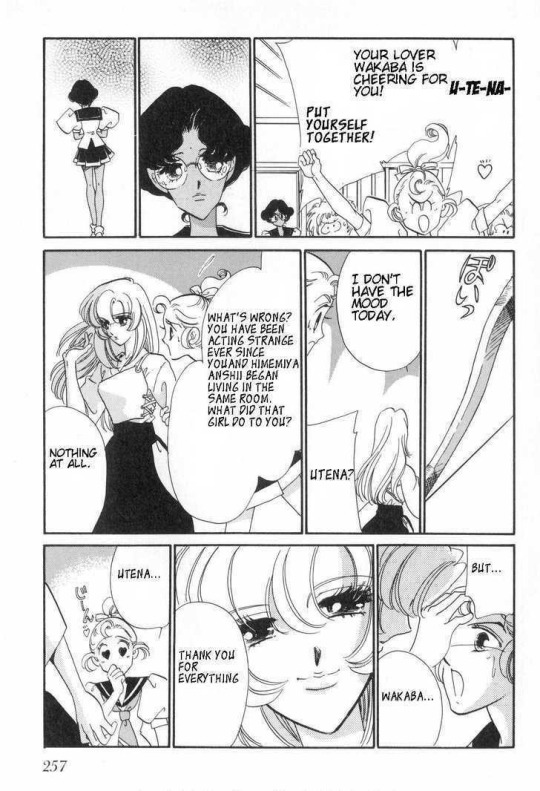
The next day she’s still distracted thinking about it, throwing off her archery game, though we do get a cute moment of Wakaba cheering her on, so that’s nice.

Afterwords Miki approaches Utena to talk about Juri and Touga. He feels bad for Juri, and wants to go talk to Touga about it. sure I guess.

Touga’s dorm is a mansion for some reason. That’s kind of funny. I’m not sure why they’re coming here if he’s supposed to still be in the clinic?
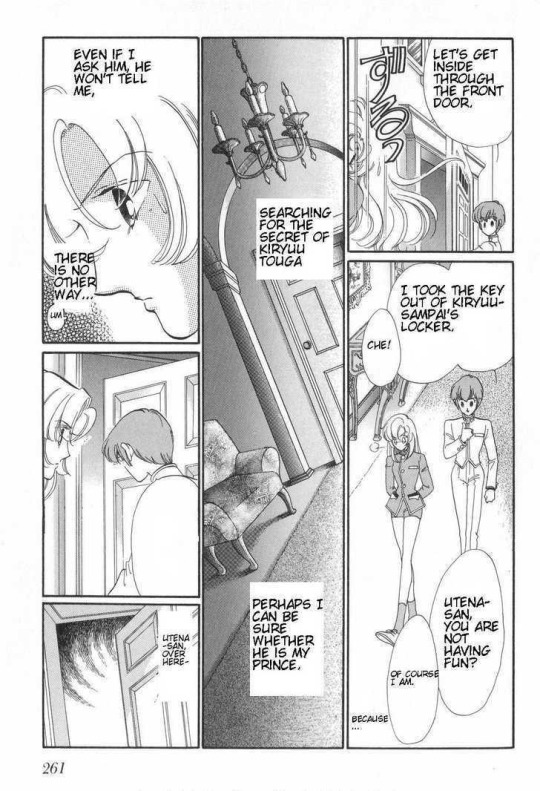
They break into Touga’s house using a spare key, and I’m still not sure why, or what they’re doing here. I mean, I know what Utena’s doing here - she’s snooping around to find out if Touga’s her prince. Manga Utena is significantly more concerned about that then anime Utena.
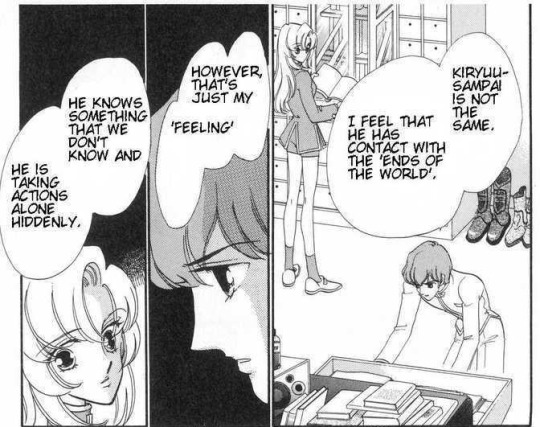
Ok, so Miki’s snooping around because he thinks Touga’s up to something and has been in communication with EotW instead of just receiving letters from them. At least I get what they’re trying to do, though not why he invited Utena on the spying mission.
Utena finda a picture of Touga and Nanami (forshadowing a future character introduction? Am I wrong about her being completely absent?), mentions how she always wanted a sibling. Miki starts to open up about whatever the manga version of his deal is when they hear someone else in the building and rush to hide.
A couple pages are out of order in the scan here, which caused a fair bit of confusion, but basically they rush to hide in a cupboard, but it turns out to be a secret door to Touga’s wizard sanctum.
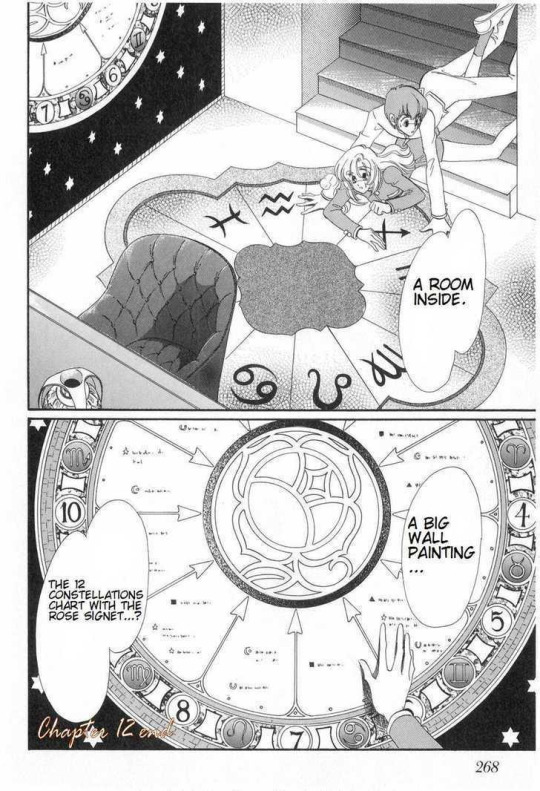
And that’s where the chapter ends.
I don’t know. It’s hard to be super invested in the rose magic wizard mystery when I feel like I mostly know what’s going on already from having watched the anime - even if there’s more detail on that side of things in the manga, where as the interpersonal character stuff - the stuff that stays compelling to me even if I already know it - is largely absent in this rendition.
I wasn’t expecting to like the manga as much as the anime going in, but even so I’m still pretty disappointed. It’s not incompetently crafted by any means, it still looks good, and some bits even look better than the anime version, but still.
But hey, maybe they’ll do something with the star signs business, and I’ll be able to make some homestuck jokes?
#rgu#revolutionary girl utena#sception reads rgu#sorry if this one comes across as bitter or disinterested#still dealing with my disappointment over manga juri#i'll get over it
17 notes
·
View notes
Text

"knowing my friend's secret makes me so happy i can't stand it"
juri, juri, juri
i'm honestly having a hard time starting this post - i feel like the episode said it all. a lot of the subtext entered the main text here, especially around the idea of secrets, not to mention nanami not-so-subtly acknowledging the metaphorical significance of the black rose sword. and through it all, juri continues to wrestle with herself, unsure of how to feel.
as souji and mamiya discuss, juri is too strong to be defeated head-on and needs to be dealt with more insidiously through shiori's parasitism. utena's noble, pure heart prevents her from seeing through shiori's act, but anthy, all too familiar with the cruelty of others, recognizes the truth. juri, too, jaded by her past experiences, seems aware of the trap being set for her, but she can't resist her own feelings now that shiori has returned. her journey this episode veers from one extreme to another - at first, she feels comfortable saying she hates shiori, even as an orange rose petal falls, and this sense of strength manifests in her elevated fencing capabilities. once shiori appears, however, she begins to see herself as weak, as evidenced by her reluctance to part with the locket, which she desperately throws into the pond, releasing it into the world and sealing her own fate. of the student council, juri's story seems the most tragic in the classic sense - fated to inevitable sorrow, bereft of the miracle that could free her.
"believe in miracles." it's a line that i puzzle over, knowing shiori's own internal war between her admiration for and jealousy toward juri. like the bird hitting the window, shiori cannot see that which is hidden right before her eyes, unaware of juri's feelings and hurting herself in trying to harm juri. what was the miracle shiori hoped for? equality to, or superiority over juri? the revelation of the locket should bring her satisfaction, knowing that she finally truly has power over juri, but it doesn't. whatever part of her still respects and maybe even wants to love juri cannot take pleasure in her suffering, no matter how much she tells herself she can't endure juri's pity - after all, there's no way juri could genuinely be kind to her, is there? only the black rose can offer shiori such stark clarity of purpose, coagulating her feelings into pure hatred.
in a sequence akin to kozue's encounter with miki, shiori affects intimacy with juri, caressing her and confessing her own disdain. juri arches back as the sword of her heart emerges. nanami's insinuative question to miki, "what did it feel like?" hangs over the scene. i've made this connection before, but the influence on steven universe feels particularly evident here: like fusion, the pulling of the sword is a metaphor for different kinds of intimacy, though it isn't one-to-one for anything in particular (as much as some su fans want it to be explicitly and consistently sexual). of course, it's not not sexual, especially here, though like the other black rose encounters there's a clear atmosphere of violation - kanae is unwillingly penetrated by the rose, while miki and juri are vaguely seduced before being painfully laid bare. this all of course begs the question of what is happening when utena pulls the sword from anthy. while the black rose duelists scream in pain, anthy gently closes her eyes and lies back peacefully, suggesting that this process isn't painful for her, but is this merely a matter of how used to it she is? for the black rose duelists, this is their first time, a moment of great emotional anguish and weight - for anthy, it's just another day at work. what was it like for her, the first time? as nanami wonders, did it hurt? does it still?
utena arrives at the arena, shocked to learn that shiori has bad blood with juri, while anthy stands there, unsurprised. the duel proves less challenging than the one against kozue, and shiori falls swiftly. afterward, utena struggles to make sense of it. how could shiori, juri's childhood friend, seem so sweet while harboring such malicious feelings? anthy tries to explain: shiori hasn't changed, and she isn't contradicting herself. the part of her that is loving and the part of her that is hateful are inextricable pieces of herself, and she still hasn't figured out how to make peace with that.
neither has juri.
stray thoughts:
utena's therapy sessions with akio have become more regular. maybe anthy's continued secrecy makes her feel like she can't fully open up to her yet? at least akio is there to provide advice via astrological metaphors.
nanami continues to hold court in her brother's absence, even seizing control of miki's stopwatch. although miki doesn't answer her question, i like these windows into how differently nanami governs the council as compared to her brother: she's curious and wants to involve the others.
souji's comments after shiori's defeat imply that she'll return, and i look forward to it - as much as i enjoyed the focus on juri, this episode felt like it left plenty more to say.
blood play? in my shoujo anime? quite a potent illustration of "sucking out the poison," lol
11 notes
·
View notes
Note
hi sorry i was off the internet for a few days so im late, if you're still doing the ask game, 9, 14, 30 AND 31, even if noncanon! (feel free to skip or replace with any number you want to answer instead) if not, just have a wonderful day!
you don't have to apologize at all, my dear! i totally understand being offline <3 thanks for the ask!
9. do you have a "type"? if so, what is it?
i'm so into redheads it makes me look stupid LSKHDFLKSDf. i also love anyone who's alternative looking in any way. i know that casts a wide net lol. as for like, butches vs. femmes, i love them both! couldn't decide a preference between the two <3
14. list five things you look for in a partner, or five things you love about your current partner(s).
autism. like unironically i couldn't be with a neurotypical.
must love music!!! some people genuinely don't care about music, could never be me.
willing to talk about feelings, not just let them fester. i'm a chronic worrier and i hyperfixate on negativity, so i NEED to be able to talk with a partner and try to help them any way i can.
a genuine understanding/love of lesbian culture and history. even if my partner isn't a lesbian, i'd want them to know and understand and care about lesbian identity because it's something that's deeply important to me.
they have to be a bottom/verse SLKDHGLSKDFH i'm a stone top lmfao.
30. who's your favorite sapphic character?
GOD. GOD. okay uhhh well i'm always on the utena grind and. juri arisugawa fuckin speaks to me. absolute icon of lesbian yearning, self-doubt, wanting to believe in fate and miracles but ultimately bogged down by cynicism. i adore her.

fuck she's a redhead too isn't she LSKDHFLSKDFH
31. LEAST favorite sapphic character?
oh wow um. thinking thinking... honestly, i didn't care for either of the leads in Carol. i don't hate them, and it's a good movie, they were just. boring.
2 notes
·
View notes
Text
Can't stop thinking about Chainsaw Man/Utena parallels.
what if you simply swapped the main characters?
(spoilers for both shows obviously)
Utena as Chainsaw Man
An orphan girl with a devil for a heart gets a job hunting devils, and comes to realize that maybe being the superheroic Chainsaw Man isn't all it's cracked up to be. She meets a bunch of weird flawed people who don't live up to her fairytale ideals. She grapples with having a masculine, inhuman alter-ego. She struggles to find agency. She and Aki bond over their lofty goals. She has so many funny feelings about powerful women. Eventually, she realizes that being Makima's knight isn't what she wants, and she breaks free to live a normal life free of impossible expectations.
---
Utena in Denji's role would have all sorts of complex gender thoughts about being able to flip a switch and immediately become a superheroic prince. Instead of Denji's "I wanna touch boobs" as a misunderstanding of his desire for intimacy, I think Utena would initially want a harem fanclub of girls swooning over her. She would think of it as a heroic princely thing, but it'd actually just be a gay thing. Also, Quanxi is like the peak form of a female prince, so she probably has to be promoted to an important narrative foil.
I think Utena would actually fall even harder for Makima's manipulation than Denji did, partially because a beautiful woman saying "please be a superhero for me" is exactly what Utena already wants. Makima wouldn't even need to seduce her into it. Also, Denji knew he was attracted to Makima, but just didn't understand why it was a bad idea. Utena doesn't even initially realize her feelings, so she has a whole extra layer of stuff to unpack before she could decide to escape.
Denji Tenjou as The Revolutionary Prince/ss
An orphan boy who was rescued by a prince can't decide if he'd rather be a prince or a princess, so he settles for being a nobody. In the high society of Ohtori Academy, he is an uncouth hooligan. He kicks Saionji in the balls a dozen times instead of challenging him to a duel. Once Denji is wrapped up in the duels for the Rose Bride, he eventually realizes that, despite his desire for human connection, the structure of the duels(and the gender roles they represent) mean that there's no way he can be close to Anthy without hurting her. He realizes that he wants no part in that sort of manhood, and decides the only way to have a genuine connection with his weird roommate, is to become her guard dog and tear apart the power structures that force them both into gender roles. Also, Denji realizes he's probably not a dude.
---
Writing Denji and Anthy as having any romance at all feels like undercutting an important gay icon, but luckily I think it's in character for Denji to have a totally platonic relationship with Anthy. Unfortunately, it's also in character for him to initially, be very excited about the idea of having a girl he can boss around, but I think he would quickly realize how fucked up it is, even if he couldn't express why. I think he'd treat Anthy like a sibling for the most part. Maybe he'd try to hook up with other women on campus, but I think he'd fail catastrophically at it. As the duels go on, he would slowly piece together that basically no one on campus has healthy relationships. He would arrive at the idea that under the current system, any kind of healthy relationship is basially impossible, and decide the only way out is to end the duels for good. Denji would fight so dirty. Even if the duels are still fought with swords, I think Akio ends up getting chainsawed in half somehow.
---
Also I think these are somehow happening at the same time in the same world and somehow they cross over.
19 notes
·
View notes